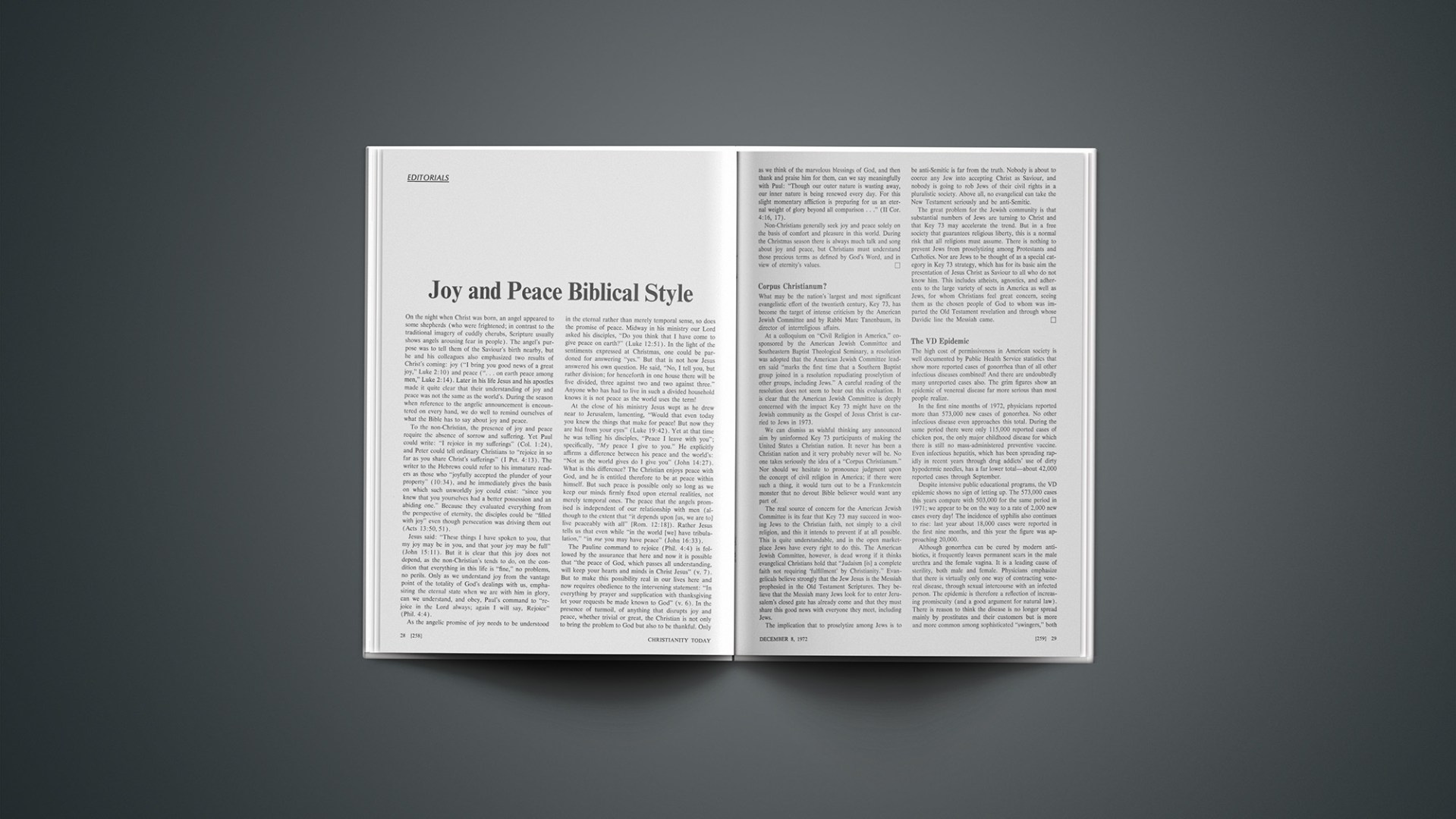On the night when Christ was born, an angel appeared to some shepherds (who were frightened; in contrast to the traditional imagery of cuddly cherubs, Scripture usually shows angels arousing fear in people). The angel’s purpose was to tell them of the Saviour’s birth nearby, but he and his colleagues also emphasized two results of Christ’s coming: joy (“I bring you good news of a great joy,” Luke 2:10) and peace (“… on earth peace among men,” Luke 2:14). Later in his life Jesus and his apostles made it quite clear that their understanding of joy and peace was not the same as the world’s. During the season when reference to the angelic announcement is encountered on every hand, we do well to remind ourselves of what the Bible has to say about joy and peace.
To the non-Christian, the presence of joy and peace require the absence of sorrow and suffering. Yet Paul could write: “I rejoice in my sufferings” (Col. 1:24), and Peter could tell ordinary Christians to “rejoice in so far as you share Christ’s sufferings” (1 Pet. 4:13). The writer to the Hebrews could refer to his immature readers as those who “joyfully accepted the plunder of your property” (10:34), and he immediately gives the basis on which such unworldly joy could exist: “since you knew that you yourselves had a better possession and an abiding one.” Because they evaluated everything from the perspective of eternity, the disciples could be “filled with joy” even though persecution was driving them out (Acts 13:50, 51).
Jesus said: “These things I have spoken to you, that my joy may be in you, and that your joy may be full” (John 15:11). But it is clear that this joy does not depend, as the non-Christian’s tends to do, on the condition that everything in this life is “fine,” no problems, no perils. Only as we understand joy from the vantage point of the totality of God’s dealings with us, emphasizing the eternal state when we are with him in glory, can we understand, and obey, Paul’s command to “rejoice in the Lord always; again I will say, Rejoice” (Phil. 4:4).
As the angelic promise of joy needs to be understood in the eternal rather than merely temporal sense, so does the promise of peace. Midway in his ministry our Lord asked his disciples, “Do you think that I have come to give peace on earth?” (Luke 12:51). In the light of the sentiments expressed at Christmas, one could be pardoned for answering “yes.” But that is not how Jesus answered his own question. He said, “No, I tell you, but rather division; for henceforth in one house there will be five divided, three against two and two against three.” Anyone who has had to live in such a divided household knows it is not peace as the world uses the term!
At the close of his ministry Jesus wept as he drew near to Jerusalem, lamenting, “Would that even today you knew the things that make for peace! But now they are hid from your eyes” (Luke 19:42). Yet at that time he was telling his disciples, “Peace I leave with you”; specifically, “My peace I give to you.” He explicitly affirms a difference between his peace and the world’s: “Not as the world gives do I give you” (John 14:27). What is this difference? The Christian enjoys peace with God, and he is entitled therefore to be at peace within himself. But such peace is possible only so long as we keep our minds firmly fixed upon eternal realities, not merely temporal ones. The peace that the angels promised is independent of our relationship with men (although to the extent that “it depends upon [us, we are to] live peaceably with all” [Rom. 12:18]). Rather Jesus tells us that even while “in the world [we] have tribulation,” “in me you may have peace” (John 16:33).
The Pauline command to rejoice (Phil. 4:4) is followed by the assurance that here and now it is possible that “the peace of God, which passes all understanding, will keep your hearts and minds in Christ Jesus” (v. 7). But to make this possibility real in our lives here and now requires obedience to the intervening statement: “In everything by prayer and supplication with thanksgiving let your requests be made known to God” (v. 6). In the presence of turmoil, of anything that disrupts joy and peace, whether trivial or great, the Christian is not only to bring the problem to God but also to be thankful. Only as we think of the marvelous blessings of God, and then thank and praise him for them, can we say meaningfully with Paul: “Though our outer nature is wasting away, our inner nature is being renewed every day. For this slight momentary affliction is preparing for us an eternal weight of glory beyond all comparison …” (2 Cor. 4:16, 17).
Non-Christians generally seek joy and peace solely on the basis of comfort and pleasure in this world. During the Christmas season there is always much talk and song about joy and peace, but Christians must understand those precious terms as defined by God’s Word, and in view of eternity’s values.










